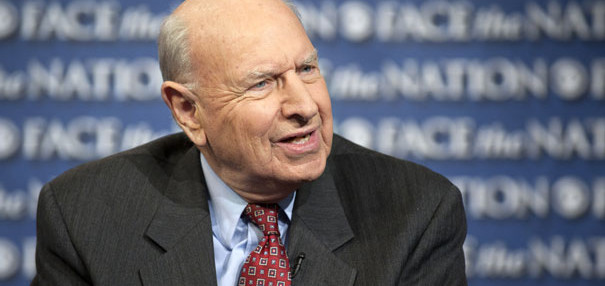Thomas R. Pickering: The Benghazi and Khost coverups

Darren J. LaBonte, former Army Ranger, FBI agent and CIA operations officer. Photo courtesy of the Huffington Post.
Since President Obama took office there have been a number of strategically successful attacks by radical Islamists against US special forces units, the CIA and Department of State. In each case, due to security failures, these attacks ended in the largest loss of life for our Navy Seals (Extortion 17), CIA field operators (Khost, Afghanistan) and the first loss of a US Ambassador (Benghazi, Libya) in over 30 years.
One name that comes up in two of these tragic incidents is Thomas R. Pickering (above photo courtesy of the AP). Thomas Reeve “Tom” Pickering, is a retired United States ambassador. Among his diplomatic appointments, he served as U.S. Ambassador to the United Nations from 1989 to 1992.
Many have never heard of Khost, Afghanistan. However, Venice, Florida residents David and Camille LaBonte will never forget that name. Their son Darren James LaBonte, a former Army Ranger, FBI agent and CIA operations officer, was killed in Khost on December 30, 2009.
“Khost” is the short name for Chapman Airfield, a secret CIA operations base located near Khost, Afghanistan. It was on December 30, 2009 at Khost that the US suffered the loss of seven CIA operations officers, a Jordanian General Intelligence Department (GID or Mukhabarat) officer and two Blackwater security guards detailed to protect the base and its CIA personnel.
There was no formal investigation on the Khost incident by the US Congress. However, the CIA conducted an internal investigation ordered by then Director Leon Panetta, to look at what happened in Khost. According to Mark Mazzetti of the New York Times, “The internal investigation documents a litany of breakdowns leading to the Dec. 30 attack at the Khost base that killed seven C.I.A. employees, the deadliest day for the spy agency since the 1983 bombing of the American Embassy in Beirut. Besides the failure to pass on warnings about the bomber, Humam Khalil Abu-Mulal al-Balawi, the C.I.A. investigation chronicled major security lapses at the base in Afghanistan, a lack of war zone experience among the agency’s personnel at the base, insufficient vetting of the alleged defector and a murky chain of command with different branches of the intelligence agency competing for control over the operation.” [Emphasis added]
“Some of these failures mirror other lapses that have bedeviled the sprawling intelligence and anti-terrorism community in the past several years, despite numerous efforts at reform,” notes Mazzetti.
Mazzetti states, “The report found that the breakdowns were partly the result of C.I.A. officers’ wanting to believe they had finally come across the thing that had eluded them for years: a golden source who could lead them to the terror network’s second highest figure, Ayman al-Zawahri.”
Fast forward to September 11, 2012 and Benghazi. It was Pickering who lead the internal investigation ordered by former Secretary of State Hillary Clinton.
The Pickering Benghazi internal investigation found:
- The attacks in Benghazi were security-related, resulting in the deaths of four U.S. personnel after terrorists attacked two separate U.S. government facilities – the Special Mission compound (SMC) and the Annex.
- Systemic failures and leadership and management deficiencies at senior levels within two bureaus of the State Department resulted in a Special Mission security posture that was inadequate for Benghazi and grossly inadequate to deal with the attack that took place.
- Notwithstanding the proper implementation of security systems and procedures and remarkable heroism shown by American personnel, those systems themselves and the Libyan response fell short in the face of a series of attacks that began with the sudden penetration of the Special Mission compound by dozens of armed attackers.
- The Board found that intelligence provided no immediate, specific tactical warning of the September 11 attacks. Known gaps existed in the intelligence community’s understanding of extremist militias in Libya and the potential threat they posed to U.S. interests, although some threats were known to exist.
- The Board found that certain senior State Department officials within two bureaus in critical positions of authority and responsibility in Washington demonstrated a lack of proactive leadership and management ability.
These two internal investigations sound eerily similar. Were both accurate portrayals that led to changes or just reports to be filed and forgotten? The Pickering report on Benghazi quotes George Santayana who wrote, “Those who cannot remember the past are condemned to repeat it.” First came Khost then came Benghazi. Did our national leaders forget the lessons of Khost and did they repeat the same mistakes in Benghazi two years later?
You be the judge.



Trackbacks & Pingbacks
[…] is time to analyze the Obama Doctrine on terrorism as we reflect, as a nation, on our loses in Afghanistan and Iraq, the Benghazi attack, Extortion 17, Syria, Iran, Ukraine, Crimea and the over […]
[…] is time to analyse the Obama Doctrine on terrorism as we reflect as a nation on our loses in Afghanistan, Benghazi, Extortion 17, Syria, Iran, Ukraine and the over 55 attacks against the homeland by […]
[…] The handpicked Accountability Review Board included as Chair, Former Under Secretary of State Tom Pickering. Note the subpoena referenced in a letter to Pickering in mid-May by House Oversight Chair, Darrell […]
Comments are closed.